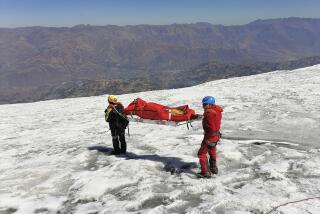A Hip Mountain Town Boasts One Extra-Cool Resident
- Share via
NEDERLAND, Colo. — He hasn’t been seen or heard from in years, but Bredo Morstoel is the most talked-about resident of this Rocky Mountain hamlet.
Known simply as “Bredo,” the Norwegian grandfather has been the catalyst for scientific research, police searches, Town Hall debates and a radio station’s plea for help in finding him a place to stay.
Now he is about to gain wider recognition through a movie about his life, or, more accurately, his afterlife.
Bredo Morstoel has been dead for nine years.
“Oh, yes, the never-ending saga of the guy on ice,” Annie Dwyre, owner of Whistler’s Cafe, said as she poured coffee for yet another curious reporter.
Morstoel’s body lies in a sealed, chain-wrapped coffin inside the type of metal shed most people use to store tractors and chain saws.
The only regular visitor to his mountainside resting place these days is Bo Shaffer, who shows up every three weeks to deliver the half-ton of dry ice needed to keep Morstoel’s corpse frozen.
Meanwhile, his Norwegian grandson, Trygve Bauge, is waging an intercontinental struggle on two fronts: 1) to be allowed to return to the United States, and 2) to bring Bredo Morstoel back to life.
“It’s a story of love, death, ice and high hopes,” says Robin Beeck, the Boulder filmmaker whose 25-minute “Grandpa’s in the TUFF Shed” premieres this weekend at Telluride’s Mountainfilm ’98 festival.
Grandson Bauge, 40, believes the movie will draw attention to his research into life extension and cryonics, the process of freezing people until science finds a cure for whatever killed them.
Bauge admits that ending up frozen in a storage building wasn’t his grandfather’s idea.
“It was a pilot project,” Bauge said from his home in exile in Oslo.
Bauge lived in the Boulder area from 1980 to 1994. When his grandfather died in Norway at age 89, Bauge shipped the body to a cryonics facility in California, then to a shed on his property in Nederland, about 30 miles northwest of Denver.
No one knew Morstoel was there until five years later when Bauge was deported for refusing to renew his visa.
Four days after he returned to Norway, police searched his deserted property and found the frozen bodies of Morstoel and a Chicago man, Al Campbell, in a flimsy shed. Campbell’s family took his body back, but after a fight with town officials who wanted him removed, Morstoel stayed put.
Friends handled the ice deliveries until Bauge hired Shaffer’s environmental consulting firm. Winds demolished the shed, so TUFF Shed, a Denver-based company, donated a new one.
Townspeople said they’re not bothered by having a frozen body as a neighbor. This is, after all, a town that takes the oddball in stride.
Nederland, elevation 8,236 and population 1,500, started as a scrappy 19th-century gold-mining outpost. Today, it’s home to a mix of entrepreneurs and laborers, families and students, plus hippie holdouts, mountain loners and New Age eccentrics like Bauge.
“You have to be a little bit weird to live here,” said Jim Reynolds, an excavator who helped build Bauge’s home.
Reynolds sipped coffee in Whistler’s Cafe, while outside a sun the color of lemon ice shone through thin clouds. Even in April, snow and ice still framed Nederland’s log buildings.
“Trygve was an oddball, but the majority of people who move here are seeking some freedom of expression,” Reynolds’ son, Heath Dillon, said. “If he believed someday he could save his grandfather, we’re all for it.”
Meanwhile, back in Oslo, Bauge continues to work on ways to lengthen life.
His company, Life Extension Systems, promotes regimens that include coffee enemas and ice baths. He also believes all borders should be open and refuses to give up his fight with U.S. immigration officials for the right to return to Nederland visa-free.
“Life extension and longevity go hand in hand with entrepreneurial freedom and liberty,” said Bauge.
He said his goal now is to clone some of his grandfather’s frozen cells.
“I think he’s onto something,” filmmaker Beeck said. “I just think he’s a little bit before his time.”
More to Read
Sign up for The Wild
We’ll help you find the best places to hike, bike and run, as well as the perfect silent spots for meditation and yoga.
You may occasionally receive promotional content from the Los Angeles Times.




